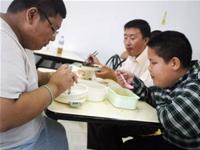Many people aware of their overweight status resort to dieting, purchasing weight loss equipment, and yet end up complaining: “Why do I keep gaining weight?” There are too many misconceptions that are frustrating when it comes to obesity…
According to Dr. Đào Thị Yến Phi, who works at the Training Center for Health Personnel in Ho Chi Minh City, while pursuing various weight loss methods or treating obesity through energy balance approaches such as dieting, physical activity, medication, and surgery…, many people often have misconceptions about the selection and adherence to a weight loss method, nutrition, exercise, aesthetic interventions, and certain weight loss medications.
 |
|
(Photo: TTO) |
Misconceptions about nutrition arise because many believe that to lose weight, they should consume oils but avoid fats. They forget that what needs to be reduced is fat in general, not just oil or grease. To reduce fat accumulation in the body, it is not enough to simply avoid fats; one must also be cautious about carbohydrates and proteins, as excess amounts can be converted into fat by the liver.
Foods labeled as “cholesterol-free” are also not safe for individuals with high blood cholesterol, as plant-based ingredients that contain high levels of saturated fatty acids can stimulate the body to produce harmful saturated cholesterol.
Some people complain, “I eat grapefruit from one fruit to another, but why do I still gain weight?” Consuming fruits like pineapple and grapefruit after meals can still lead to weight gain, as they only help with weight loss when used to replace a portion of a main meal. If one continues to eat freely and then adds grapefruit at the end of a meal, that would increase calorie intake.
When overweight, it is advisable to drink milk. It may sound counterintuitive, but each 200ml glass of milk is equivalent to half a bowl of rice while providing all the necessary vitamins, minerals, and proteins for the body, making it a good substitute for breakfast…
Others lament, “I only eat one dinner a day, but why do I still gain weight?” Eating fewer meals does not lead to weight loss compared to eating more frequently. The key issue is that the total energy intake throughout the day determines weight gain or loss, not the number of meals.
Many people fluctuate between gaining and losing weight, often ending up heavier after each cycle. After losing weight, one should not return to previous eating habits. It is important to remember that gaining weight a second time is easier than the first time, and losing weight a second time is harder than the first.
Misconceptions about exercise also need attention. It is a misconception that bodyweight exercises are more effective than using multi-function machines for just a few minutes. The intensity of physical activity and the duration of workouts are what burn energy in the body, not the equipment itself. One cannot expect to sit still while a machine does the work and lose weight! There is no truth to the idea that one can specifically target fat loss in certain areas by exercising those parts. Additionally, exercising does not allow one to eat freely, as weight gain results from consuming more than the body’s energy needs. While fasting may seem easier than exercising, physical activity is better for health compared to fasting.
Another common misconception is that aesthetic interventions like massage, detox baths, hot wraps, fat-burning creams, sauna, waist training, or high-temperature treatments can lead to weight loss. All these methods do not contribute to weight loss but merely stimulate local circulation or cause temporary water loss in the body.
The final misconception is that taking weight loss pills allows one to eat freely, which is incorrect. Medications should only be used when all other weight loss methods have been exhausted or alongside other weight loss strategies that yield no results. Be cautious, as quick weight loss pills often primarily reduce water weight, as actual fat loss cannot happen overnight, and fat cells regenerate quickly.
Currently, the battle against overweight and obesity is a global issue, including in Vietnam. The health risks associated with obesity can lead to death at any time.
NGỌC THÚY


















































